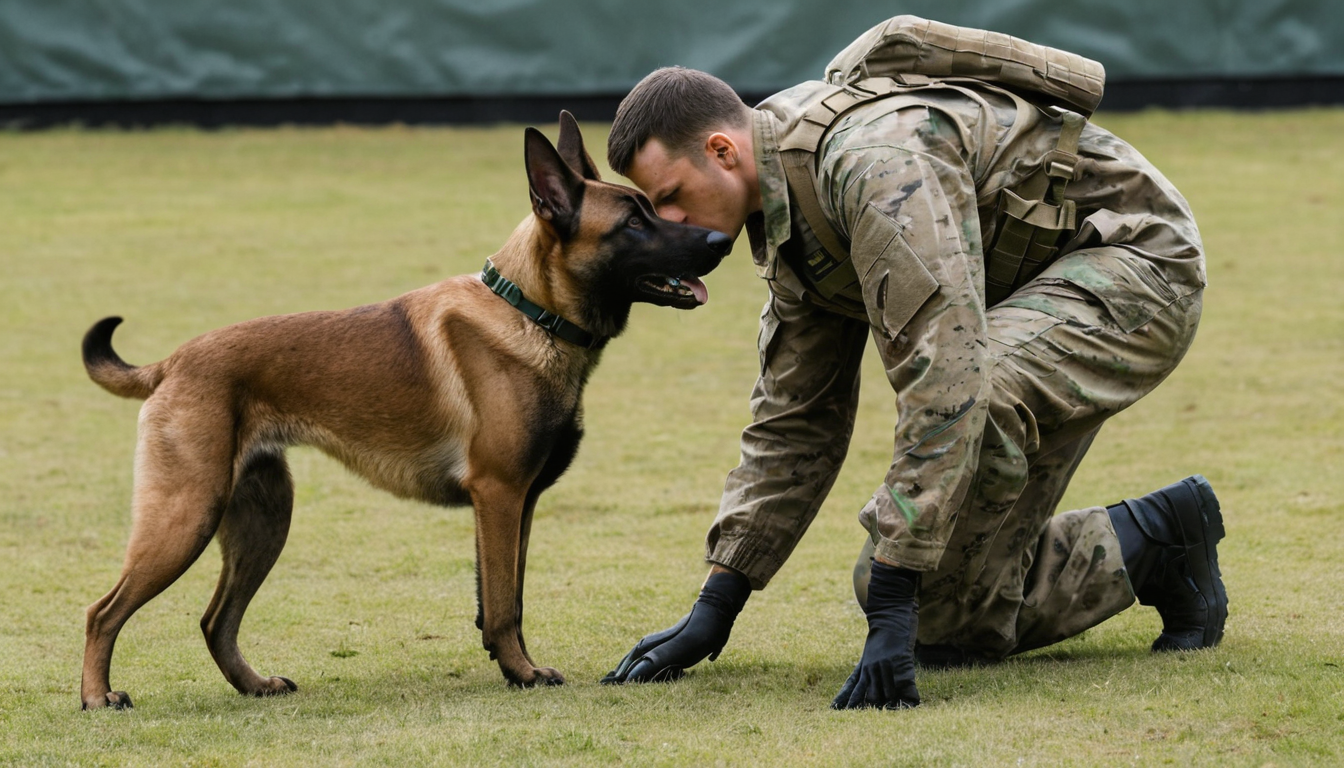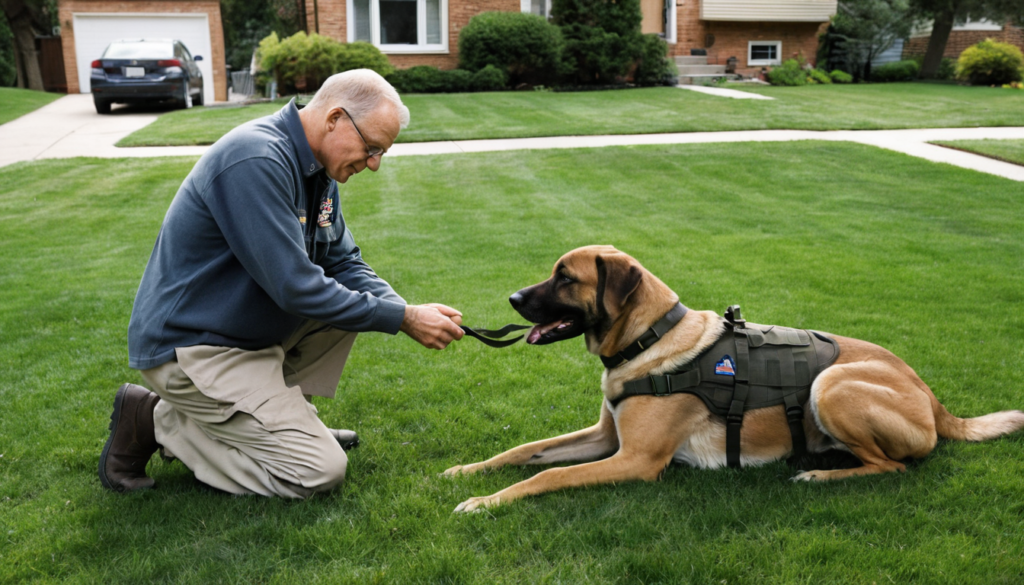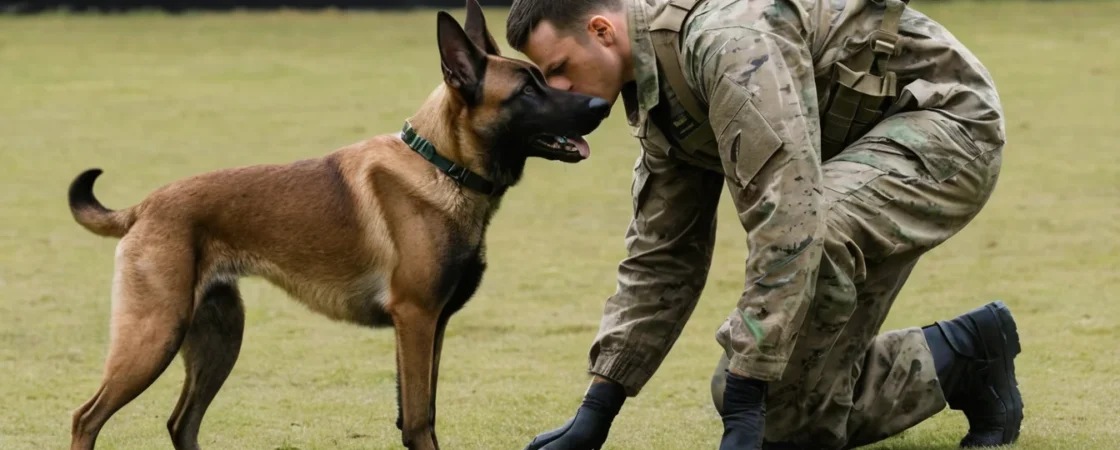In the unforgiving terrain of Afghanistan, where danger could hide in any shadow, one of the U.S. Marine Corps’ most trusted protectors wasn’t just a fellow Marine but a Belgian Malinois named Max. Starting his service in 2011, Max was trained to detect explosives—a skill that would soon prove essential not only for his handler but for the entire Marine unit he served alongside. For Max, each mission was more than a job; it was a calling, a purpose that would cement his legacy as a war hero and loyal companion.

Max’s training was no easy task. Belgian Malinois are known for their intelligence, drive, and fearlessness, making them ideal for military work. Max’s training began with basic obedience but quickly intensified. Day after day, he was exposed to different types of explosives, learning to identify their scent and communicate to his handler where they were hidden. Each time he successfully completed a drill, Max would be rewarded, reinforcing his abilities and building his confidence. By the time he was deployed to Afghanistan, Max was not only trained but bonded with his handler, a young Marine named Corporal James Harlan. The connection they shared went beyond commands and tasks—they trusted each other’s instincts and relied on each other to stay safe in life-or-death situations.
One of Max’s first missions was in a high-risk area where insurgents were known to plant IEDs, improvised explosive devices, in an effort to catch unsuspecting troops. The environment was unforgiving; the heat was intense, and every step could be a fatal one. For Marines, a single IED could result in catastrophic losses, which made Max’s role all the more crucial. His keen sense of smell and ability to detect explosives allowed him to lead the team with a precision that machinery or technology simply couldn’t match.
During one particular patrol, Max’s exceptional skills became the saving grace of the mission. The team was tasked with sweeping a route known for frequent ambushes. Corporal Harlan held Max’s leash tightly, watching as his companion moved methodically through the terrain. Max would pause, sniff, and then continue, his body language communicating that the path was clear. As they approached a section of the road that looked no different from the rest, Max suddenly stopped, his posture shifting. His tail went stiff, his ears perked, and he turned his head to his handler—a clear signal that something dangerous lay ahead.
Corporal Harlan immediately halted the team, communicating with his fellow Marines to hold their position. Max continued to sniff around, slowly circling a patch of dirt and rocks. Using his training, Corporal Harlan knew this behavior meant Max had detected the scent of an explosive. Sure enough, upon further inspection, the Marines found a carefully hidden IED, buried just beneath the surface. Thanks to Max’s sharp instincts, the team was able to disarm the device, avoiding a potentially deadly encounter. Max’s alertness had not only protected his handler but also saved the lives of the entire unit.
Word of Max’s bravery spread through the ranks, and he quickly gained a reputation as one of the most reliable and effective K9s in the Marine Corps. This was just one of many instances where Max’s quick thinking and finely honed senses helped his team avoid disaster. On numerous missions, Max detected explosives, alerting his handler and providing his team with a sense of security that would have otherwise been impossible in such perilous conditions. For the Marines who served alongside him, Max was more than just a dog—he was a fellow soldier, a protector, and a friend.

As his deployment continued, Max became an integral part of the team. His fellow Marines would talk to him, pet him, and treat him with the respect and camaraderie they shared with one another. Max’s loyalty to his handler and the unit was evident in every mission. He would stand by them, even in the heat of gunfire or the tension of nighttime patrols. Max’s presence gave them comfort, a reminder that someone was watching out for them in an environment where threats could materialize at any moment.
After completing several successful missions, Max’s tour came to an end. He had served bravely, with countless lives owed to his ability to sniff out danger. Upon returning home, Max was celebrated as a war hero, a title not given lightly. The Marine Corps held a ceremony in his honor, presenting him with a medal and acknowledging the courage and dedication he displayed. For Corporal Harlan, however, Max was more than a decorated officer—he was family.
As Max entered retirement, his days took on a new rhythm, filled with rest, play, and the peace that came from a job well done. Corporal Harlan, who had become deeply bonded with Max over their years of service, adopted him. For Harlan, the transition from military life to civilian life was made easier by having his loyal friend by his side. Max adapted quickly to life outside of the battlefield, but his alertness and loyalty never wavered. He remained watchful, protective, and attentive, even in the quiet suburbs where he now lived.

The local community embraced Max, with neighbors and friends hearing of his service and treating him with admiration. Children in the neighborhood would often come up to pet him, fascinated by the hero dog who had served his country. Max had given so much of himself in the line of duty, and in retirement, he was surrounded by the love and appreciation he had more than earned.
Max’s legacy lived on in the stories his fellow Marines shared, the lives he saved, and the impact he left on everyone who crossed his path. His journey, from a highly trained K9 to a war hero to a beloved family companion, spoke volumes about the courage and loyalty of military dogs. For those who knew him, Max would always be remembered as more than just a K9—he was a soldier, a hero, and a friend who gave his all for his country and his comrades. And as he lay by Corporal Harlan’s side each evening, resting peacefully, Max remained a true testament to the unbreakable bond between a K9 and his handler.



